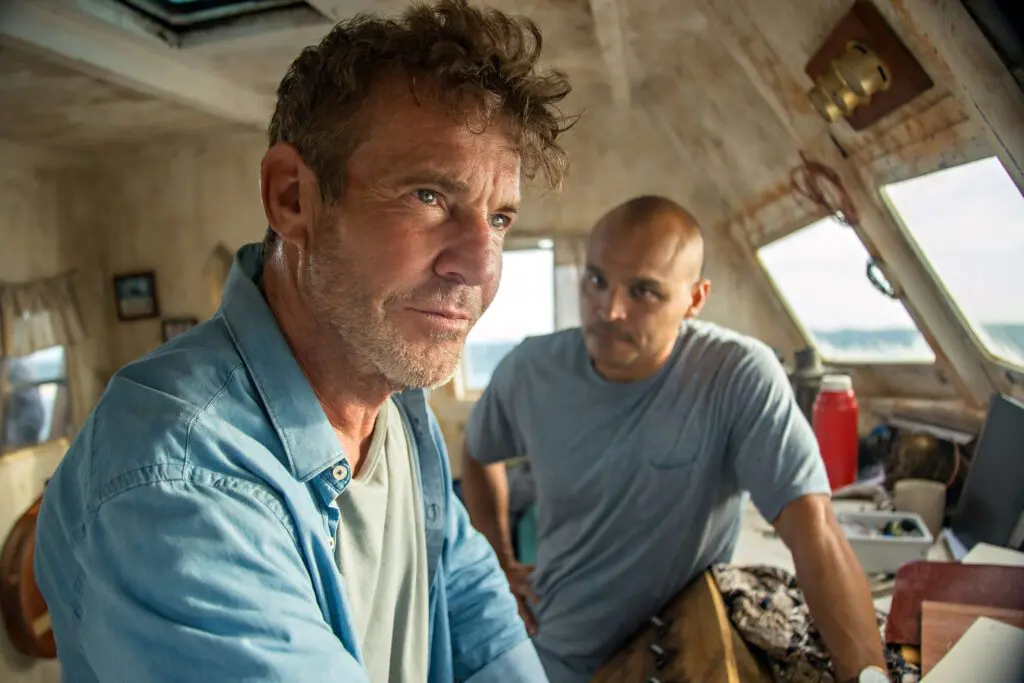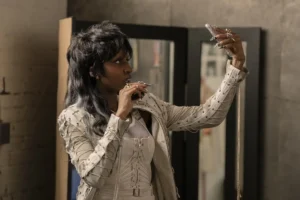Summary
Blue Miracle serves as a vehicle for a great, if not absurd, Dennis Quaid performance, offering little besides a feel-good true story with trace amounts of suspense.
The first time Dennis Quaid (Midway, On a Wing and a Prayer) appears in Blue Miracle he looks haggard. His voice sounds like the scraping of gravel as he stomps around his dingy boat, weathered by time at sea.
A retired captain and prized fisherman, Wade (a wonderful rhyming name for Quaid) hasn’t seen land for weeks, maybe months. Even when Blue Miracle shifts its focus to the orphanage of Casa Hogar, run by Omar (Jimmy Gonzales), Quaid’s presence looms as an actor with a decade defined by dog-related movies and smaller roles in less bankable films.
Director Julio Quintana’s film, inspired by real events, adheres to a formula of films that came before it, one concerned with a happy, heartening ending. Surprises come sparingly in Blue Miracle, though the Netflix drama contains a big amount of heart and joy, seen in the faces of the teenage actors who were spending day after day on the water with Quaid.
The film follows Omar and his orphanage in Mexico, Casa Hogar, as they enter the Bisbee’s Black & Blue Tournament in an attempt to save their home, teaming up with a washed-up Wade who has won the competition twice before.
It’s full of effort, never easing into a dramatic scene, an emotional appeal, or a whirl of action, with gunshots being fired behind Omar’s back in the first two minutes, kids showing each other abuse scars, and long speeches once a marlin seems to be on the line.
The success of this ragtag team never seems to be in doubt, despite multiple efforts from the young boys and Wade to sabotage themselves.
Quaid gives a somewhat manic, disturbing performance. He repels sobriety and calm, walking with both a swagger and a limp, yelling praise and insults around the boat. In some ways, it’s the best performance from the actor in years, yet, he’s almost acting in another film, lacking any amount of warmth, offset by the fatherly Omar, a patron saint of a man.
Omar gives kids miracle nails, despises the idea of cheating, and lives a thankless vocation, becoming a role model for another embattled teen every week. Wade and Omar are polar opposites, but the film lacks immediate tension because you know how it’ll end. All films like Blue Miracle end in the same way: in victory.
Still, the film works when it’s taken at face value, as a feel-good fishing trip with high stakes. When the team is out to sea, Quintana’s drama keeps your attention, simply because you don’t know when a fish might hop on the line and the reel might start turning.
Intercut flashbacks almost take away from these moments of jubilation, most experienced by boys seeing their father figure or friends try to catch the biggest fish they’ve ever seen.
Blue Miracle is light-hearted seafare, made to put a bit of warmth and inspiration into your body, hopefully giving you hope that the world isn’t so bad after all. The movie, though, suffers from a DNA that Quintana refuses to alter, telegraphed plotting, and unreasonable circumstances where miraculous becomes an understatement.
Characters don’t develop, rather, they just change at the snap of Omar’s fingers and the sound of his voice. Gonzales deserves recognition in his good-guy role, but the teens should be given more time to breathe and talk about their experiences. We care less about the kids and more about the general idea of an orphanage shutting down, which makes for a great story, not necessarily a great film missing the structure and script needed to pull out deeper emotions.
But, if you’d like to watch a guttural Dennis Quaid look half-drunk catching giant fish on a boat, Blue Miracle is undoubtedly the film for you.
Read More: Blue Miracle Ending Explained




